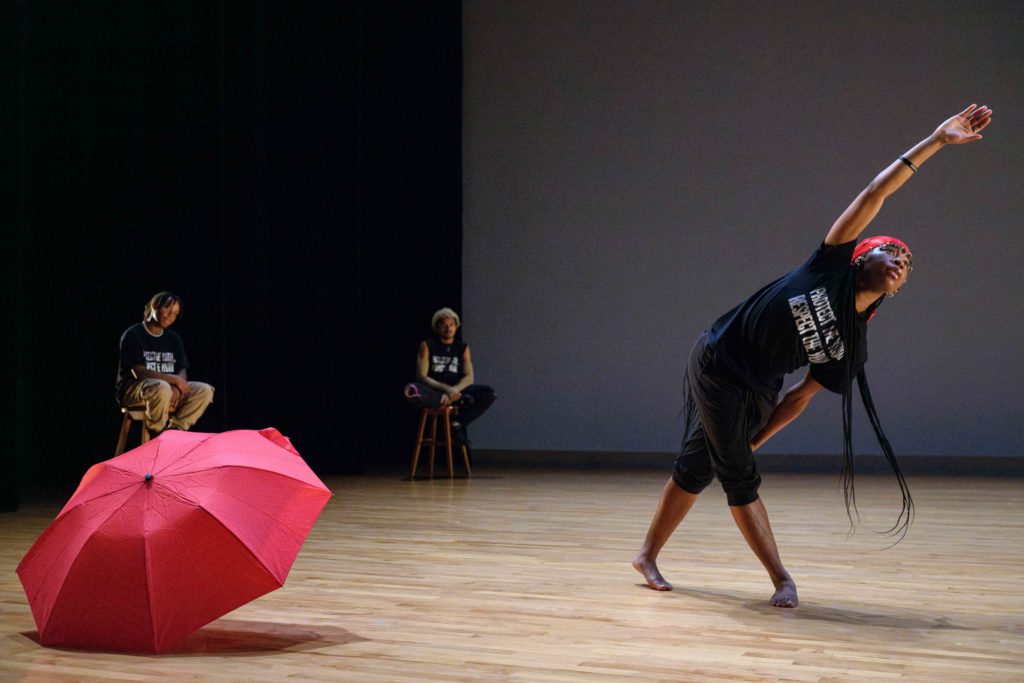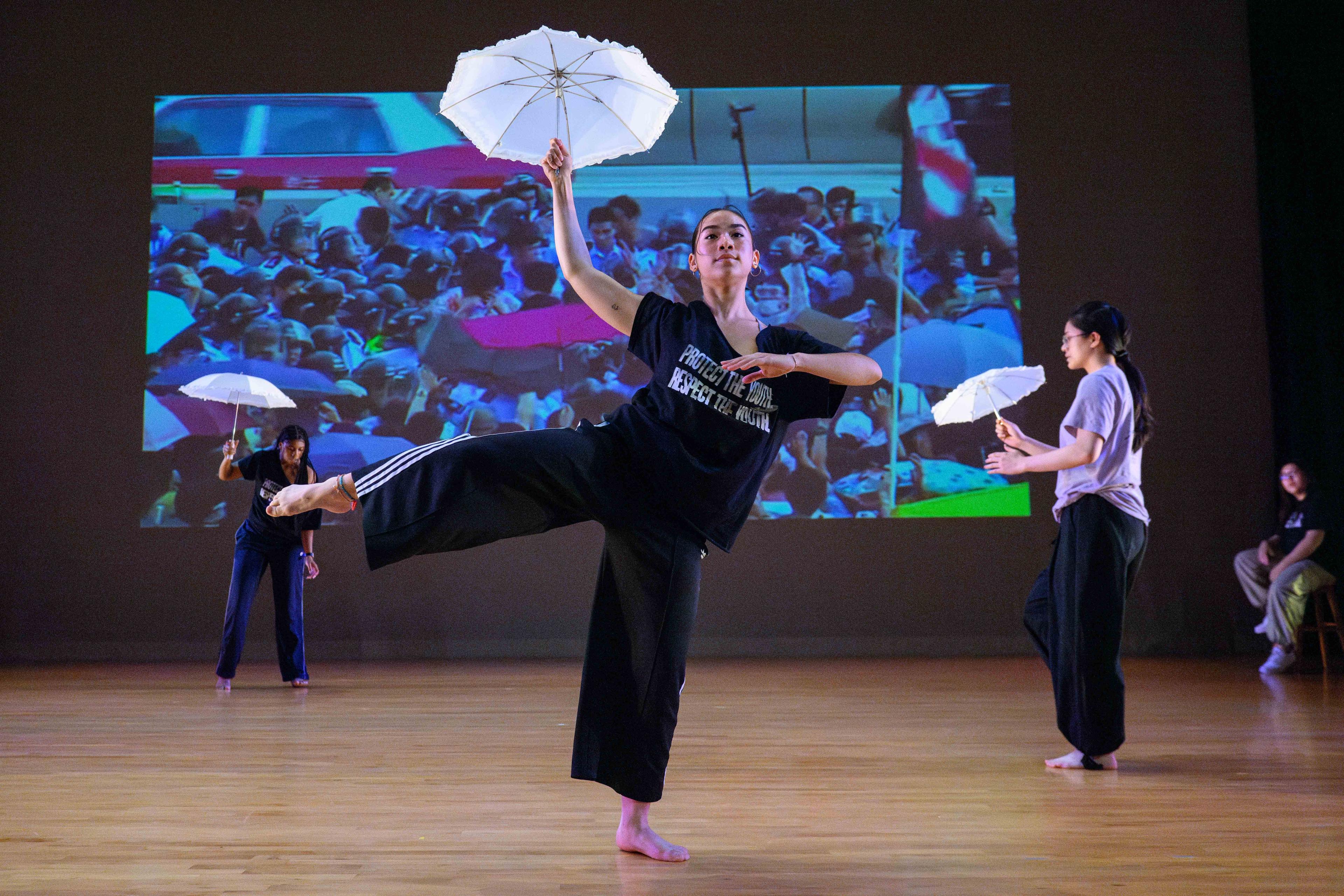Aquilah Ohemeng innovates with ‘PASS US NOT: Holy Ghosted’ choreography
Dancers carry white parasols in “PASS US NOT: Holy Ghosted.” The performance was directed by Aquilah Ohemeng, a graduate student in choreographic inquiry. (Nina Schmidt/Daily Bruin)
“PASS US NOT: Holy Ghosted”
Aquilah Ohemeng
Glorya Kaufman Dance Theater
April 26-27
8:00 p.m.
By Gavin Meichelbock
April 25, 2024 9:38 p.m.
Aquilah Ohemeng is bringing her reimagining of a 64-year-old dance to the modern stage.
The graduate student in choreographic inquiry is imbuing modern artistic expression into one of the most influential pieces of choreographed dance – Alvin Ailey’s “Revelations.” Titled “PASS US NOT: Holy Ghosted,” Ohemeng’s piece builds on the trailblazing choreographer’s creation, which uses traditional African American spirituals, blues and work songs to tell a story of faith and perseverance as it relates to slavery and freedom. Today, “Revelations” exists in the repertoire of the Alvin Ailey American Dance Theater Company as a historical piece that not only embodies Ailey’s roots but acts as an archive for Black history as well, Ohemeng said.
“I see ‘Revelations,’ the 1960 work of Alvin Ailey, as Black excellence, sophistication,” Ohemeng said. “The physicality of what the possibilities are that a Black body can do and can be in spite of circumstances that may counter or be in opposition to its own existence. I see it as traditional, as a trailblazer and as a museum piece in a way.”
Ohemeng said she was first exposed to “Revelations” in 2012, citing it as the first time she saw a performance composed entirely of Black performers. Growing up as a Black dancer, Ohemeng said she has long been aware of the name Alvin Ailey, as it has grown into its own entity for the standards of contemporary dance and concert stage performance. In 2019, Ohemeng said she saw another production of “Revelations” as a part of choreographer Rennie Harris’ dedication to Ailey called “Lazarus.”
[Related: Kyreeana Alexander’s ‘We Cool’ reimagines childhood hope for today’s adults]
Ohemeng said she was enthralled by Harris’ use of street dance and modern dance to encapsulate Ailey’s upbringing in the South and the story of how he created his own dance studio amid the Civil Rights Movement. It was this central idea of how Blackness is not monolithic that intrigued her, Ohemeng said. Contrasting “Lazarus” to Ailey’s work, Ohemeng said “Revelations” primarily focuses on uplifting and maintaining a certain set of beliefs that felt disconnected in 2019.
“I remember sitting in the audience having this thought of, ‘How could ‘Revelations’ be modernized?’” Ohemeng said. “‘What does it look like for me?’ I’m a Black Christian. I do relate to the music and the themes, but then also the historical context of it, to me, is where it’s like, ‘Huh, that’s interesting.’”

This inquiry came up again during one of her classes with professor of world arts and cultures/dance Victoria Marks, Ohemeng said. During the development of this project, Marks referred to herself as a hopefully good meddler, asking Ohemeng questions such as how the project references or challenges “Revelations.” Even though Ohemeng sought to make this monumental work from the 1960s more contemporary, she said it still holds relevance today.
“Mr. Ailey himself, in my research, has said his company is to represent the universal man,” Ohemeng said. “I find that the themes of struggle, of this wrestling with the now and spirituality – I still feel that is extremely relevant in 2024, following the events specifically in 2020, and just onward.”
When it came to crafting the movements for the piece, Ohemeng said she merged Ailey’s traditional ballet and contemporary forms with modern styles such as hip-hop, street dance, house, popping and locking. Ohemeng said in addition to the choreographed movements, there are also moments of what she calls “improvisational interventions,” from which she said she draws raw emotion as she questions the omnipresence of God.
[Related: Theater review: ‘Fat Ham’ is a must-see ‘Hamlet’ production, keeps classic charm, makes it its own]
Another modernization Ohemeng made to “Revelations” was coming up with her 21st century title, “PASS US NOT: Holy Ghosted.” The first half, Ohemeng said, is a play on “us,” referring to “us” as a people but also as the acronym for the United States. It also pulls from the hymn “Pass me not, O gentle Savior” that calls on a longing for divine intervention and the questioning of divine omnipresence, Ohemeng said. The second part, “Holy Ghosted,” references not only the Holy Ghost, Ohemeng said, but also what it means to be ghosted in modern times. She said this aspect of the title ties back to the idea of questioning divine omnipresence and feeling abandoned by a higher power.
“Revelations” is based in Christianity, but a goal of Ohemeng’s work was to incorporate the religious beliefs, or lack thereof, of the entire ensemble into the story, Ohemeng said. During the project’s development, fourth-year dance student Robbie Button said he and Ohemeng would talk about ways they could incorporate his spiritual beliefs into the performance. Button said these conversations allowed him to be a part of the storytelling, not just an echo of that of another.
After seeing the project come to fruition, Marks said “PASS US NOT: Holy Ghosted” is not merely an updated work of art, but an argument of love and commitment. It exists as a challenge to the ideologies present in the 1960s, as well as a source of hope and possibility for the current vocal generation, Marks said. With this intellectual and emotional intersection between the past and present, Ohemeng said she hopes audiences use her work to look toward the future.
“Think of it as a container to hold space for shared thoughts, emotions and even just processing this word of empathy and what it means to be kind to one another,” Ohemeng said. “I feel like with the space that I have, I want it to be almost like holding a mirror to the audience to look at their own actions and see how it impacts others.”
